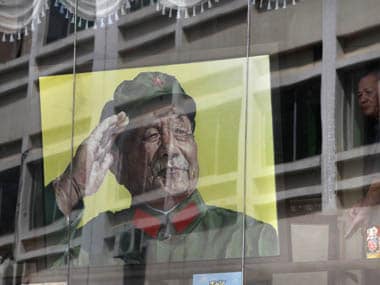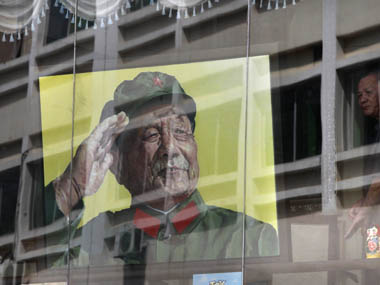In her book _The Elephant and the Dragon_about the rise of India and China, author and journalist Robyn Meredith narrates a political joke about Chinese leader Deng Xiaoping, who is in many ways considered the man who opened up the Chinese economy. In the joke, Deng is seated in his car and reading a newspaper when his driver interrupts him to say: “Comrade, we’re at a crossroads. The sign says turn left for Communism, turn right for Capitalism. Which way should I go?” And Deng says, “No problem, just signal left and turn right!”
China’s model of “socialism with Chinese characteristics”, as it was called, was in reality a way of ushering in a market economy on the sly, given the political limitations of leading a one-party state. No one was really fooled by it - except, it appears, Indian ‘comrades’.
For more than 20 years, India’s Communist leaders, reeling from the collapse of Socialism in the erstwhile Soviet Union and eastern Europe, clung to the fantasy of a Chinese socialist state by pointing to the left-turn indicator on Deng’s car. They also used the shibboleth of the Chinese ‘socialist’ model as a totem to thwart the very tentative efforts that India began in 1991 to undertake towards a halfways open market economy. But awakening, like Rip Van Winkle, from their ideological slumber of 20 years, India’s Communist comrades are beginning to realise that the altar of socialism at which they had been worshipping now hosts a “false god” in the form of China.
The Communist Party of India (Marxist) is reworking its ideological resolution for the first time in 20 years, and, according to reports , is committing a sacrilegious amendment in it to reflect that China, whose “socialism with Chinese characteristic” had long inspired the party, isn’t at all socialist. What is happening in China, according the party, reflects “trends alien to socialism.” China today, the party notes, is wracked by a huge income gap between the rich and the poor, and in fact has more billionaires than any country other than the US.The ideological amendment, which will be placed before the party congress in April for discussion, takes note that the combined income of the top 10 percent of the population had gone up by 22 times in the past 10 years. The party also sees other symptoms of China’s break from the socialist path: significantly, a growing rural-urban income gap, and a declining share of worker’ wages as a percentage of GDP. It also cites the increasing incidence of corruption as the result of China’s departure from the socialist path.
CPM leader Sitaram Yechury reasons that “growing corruption” and “growing inequalities” are both trends that are “alien to socialism.” The party now wants India to abide by “socialism with Indian characteristics.” There is a supreme irony in the CPM’s wails about China’s “abandonment” of socialist principles.
[caption id=“attachment_207350” align=“alignleft” width=“380” caption=“Deng Xiaoping, is in many ways considered the man who opened up the Chinese economy.Reuters”]
 [/caption]
[/caption]
For one thing, the radical left-wing politics and trade unionism that the Communists practice in India would never have been tolerated for a day in China. There exists only one officially recognised trade union in China - the All-China Federation of Trade Unions , the world’s largest trade union - which works alongside the management.
In the light of political developments in eastern Europe where the Solidarity trade union in Poland in the 1990s, led by Lech Walesa, led to the overthrow of the Communist regimes all across eastern Europe, China has since the 1989 Tiananmen Square protests been wary of independent trade unions. Workers in China don’t have the “right to strike”, although the Dickensian working conditions in some factories have given way in recent years to flash strikes by workers pushed to the edge.
Nor do workers have access to avenues for collective bargaining. It is this, as much as the sheer industry of Chinese migrant workers from the villages looking to make it in the cities, that has underwritten much of China’s enormous labour productivity of the last 20 years, which in turn has been the engine of China’s growth.
In India, if anything, it is the rigidities of the labour market, and the parties’ ready resort general strikes and hartals, that have held back productivity gains and economic growth. The example of the Nokku Kooli in Kerala, where unionised workers are paid a wage for merely standing by and watching, as the price for companies to use machines or their own labour, illustrates the extreme perversion of the “ all pay, no work ” culture of Indian trade unions.
Now that their communist and socialist gods in the erstwhile Soviet Union and in China have been shown to have failed, our Indian comrades can perhaps work towards labour market reforms that have the potential to unleash labour productivity in India. Comrades of India, unite and embrace these reforms! You have nothing to lose but your political and ideological irrelevance - and your inability to tell left from right (and right from wrong).
Venky Vembu attained his first Fifteen Minutes of Fame in 1984, on the threshold of his career, when paparazzi pictures of him with Maneka Gandhi were splashed in the world media under the mischievous tag ‘International Affairs’. But that’s a story he’s saving up for his memoirs… Over 25 years, Venky worked in The Indian Express, Frontline newsmagazine, Outlook Money and DNA, before joining FirstPost ahead of its launch. Additionally, he has been published, at various times, in, among other publications, The Times of India, Hindustan Times, Outlook, and Outlook Traveller.
)